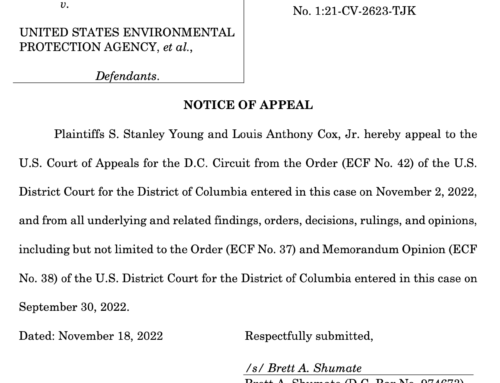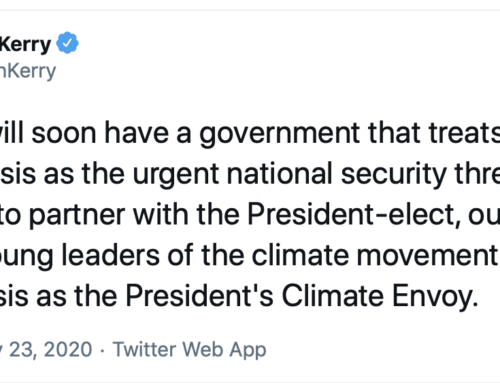For Immediate Release:
May 5, 2014
Contact:
Craig Richardson
[email protected]
U.S. District Court Grants Standing to E&E Legal in its Constitutional Challenge to the Colorado Renewable Energy Standard
Washington, D.C. – On May 1st, in deciding an early motion for summary judgment, the U.S. District Court for the District of Colorado handed down a victory to the Energy & Environment Legal Institute’s (E&E Legal’s) constitutional challenge to Colorado’s Renewable Energy Standard (RES) by deciding that E&E Legal, the plaintiff in the case, has standing. In legal terms, “standing” means that the court has found that a party in a suit has proved sufficiently that they are harmed or negatively impacted by a law in question. The defendants in the case, the Colorado Public Utility Commission and several alarmist environmental groups, including the Sierra Club, filed a procedural motion stating that the plaintiff didn’t have standing, and therefore, argued that the case should be dismissed. The Court rejected their arguments with regard to the central issue in the case, whether Colorado’s RES does damage to interstate commerce.
“The Court has recognized that the Colorado RES harms interstate Commerce,” said David W. Schnare, E&E Legal’s General Counsel and lead attorney in the case. “Next he will decide whether that damages not only citizens’ pocket books, but the Constitutional rights of our citizens, our businesses and the States that surround Colorado. A decision in favor of E&E Legal’s constitutional argument would follow other recent, similar Federal Court decisions and would lay the cornerstone to building a national effort to challenge the constitutionality of renewable standards in the other twenty-nine states with similar statutes.”
On April 4, 2011, E&E Legal, on behalf of two of its members, sued the Colorado Public Utility Commission over the constitutionality of the state’s Renewable Energy Standard (RES) mandate. That mandate establishes a renewable energy quota that requires the state’s major utilities to obtain 30 percent of their power generation from “renewable” sources by the year 2020. That statute will cost Colorado citizens up to $2 Billion a year and up to $18.5 Billion through 2020. It will increase the price of electricity by 64 percent. By 2015, the Colorado RES will cause the loss of up to 29,000 jobs, reduce wages by $2,000 a year per worker and cause 300 premature deaths each year. E&E Legal brings this case in an effort to reduce these damages as much as possible.
The lawsuit is based on the U.S. Constitution’s dormant Commerce Clause because the mandate provides economic benefits to Colorado’s renewable electricity generators that aren’t available to out-of-state renewable generators and because Colorado imposes its laws on businesses operating in other states. The RES law also discriminates against lower cost, more reliable energy generation from out of state suppliers, which is also unconstitutional.
Cases against renewable energy standard mandates are proceeding in other states as well. These include the state of Michigan, where last June the U.S. Circuit Court of Appeals handed down a decision in a suit involving the Federal Energy Regulatory Commission (FERC) against the state of Michigan regarding a FERC plan to apportion costs for new power lines to transport wind power around the Great Lakes area. In that decision, Judge Richard Posner noted that Michigan’s renewable energy standard law that forbids out-of-state wind power from being credited toward a utility’s RES requirement “trips over an insurmountable constitutional objection.” Judge Posner further explains, “Michigan cannot, without violating the commerce clause of Article I of the Constitution, discriminate against out-of-state renewable energy.”
In another recent ruling involving Minnesota’s renewable energy standards, North Dakota v. Minnesota Public Utilities Commission, the U.S. District Court of Minnesota struck down the state’s limits on coal power imports. In her decision, Judge Susan Richard Nelson borrowed some of the arguments E&E Legal put forth in its Colorado case as she held the Minnesota statute unconstitutional.
And in California, the state’s Ninth Circuit Court upheld a challenge to that state’s Low Carbon Fuel Standard against a commerce clause challenge brought by several fuel producers and consumer groups. In a highly unusual move, seven Ninth Circuit Court justices dissented in the decision, citing many of the constitutional arguments E&E Legal raised in its Colorado renewable energy standards case. E&E Legal has joined numerous other groups, including the Pacific Legal Foundation, in an amicus brief urging the U.S. Supreme Court to review the Ninth Circuit decision because it flies in the face of long settled law.
“With our case proceeding forward, and these challenges in Minnesota, Michigan, and California, it is highly probable that the constitutionality of renewable energy standard mandates will ultimately be left to the U.S. Supreme Court,” says Schnare. “Given the blatant facial violation of the Commerce Clause by these state statutes, the nation’s highest Court must either strike them down or disregard 40 years of their own jurisprudence.”
If E&E Legal prevails, states will have to convert their laws into voluntary programs, leaving to the U.S. Congress any decision on whether to mandate renewable energy quotas for electricity.
The Energy & Environment Legal Institute (E&E Legal) is a 501(c)(3) organization engaged in strategic litigation, policy research, and public education on important energy and environmental issues. Primarily through its petition litigation and transparency practice areas, E&E Legal seeks to correct onerous federal and state policies that hinder the economy, increase the cost of energy, eliminate jobs, and do little or nothing to improve the environment.






